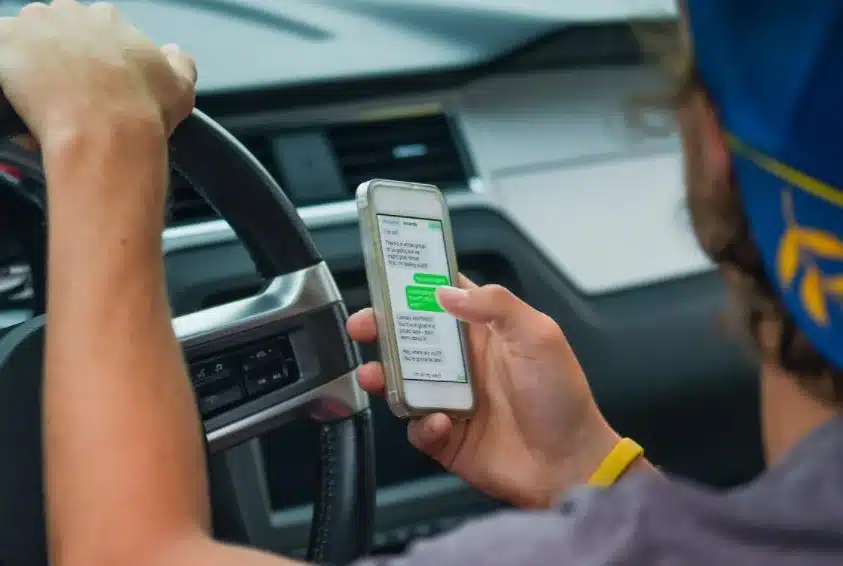Georgia has strict laws regarding texting and electronic device use while driving. In a word, “don’t” text, write or send messages, instant message, view social media, look at Internet data, or use any reading-based communication while driving. It also stands to reason that you are not permitted to watch videos on a mobile device while driving, and you should never record yourself on your smartphone while driving. You are partaking in a dangerous practice videotaping yourself with your phone (to make a social media video log) while you are in the process of driving a vehicle. In addition, you will be placing your life and the lives of others at risk by not paying attention when you are driving on the road.

In general, there is nothing to be gained for not telling the truth if you are caught using your mobile or smartphone while driving. For this reason, you should never lie about using your phone while driving if you are stopped for this reason and are noted as having done so by law enforcement authorities.
Distracted Driver Laws
Distracted driver laws are put into place to protect all drivers sharing the roads, and Georgia is a hands free state. If a driver is distracted, that individual is more likely to have a serious accident with other drivers, bicyclists, and pedestrians using the roads. It is everyone’s responsibility to be safe on the roads, just as you would expect that the drivers in the next lanes to you are being safe as well.
Violations for Distracted Drivers in Georgia, US
You will receive a misdemeanor for this type of hazardous driving in Georgia as a penalty. The penalties are accumulative if you have more than one offense. For example:
- First offense – maximum fine of $50.00 and one point on your license.
- Second offense – maximum fine of $100.00 and two points on your license.
- Third offense – maximum $150.00 in fines and three points on your license.
- Commercial driver offenses – commercial vehicle drivers who are distracted can also receive a civil penalty of a maximum of $2,750.00.
If any distracted driver receives 15 points within 24 months, that driver’s license will be suspended. Points accumulated on a license can also have a consequence of impacting other areas of your life, such as your subsequent automobile insurance rates.
Exceptions to the Distracted Driver Rules
There are a few exceptions to the Georgia distracted driver laws, which are as follows:
- If you are reporting a traffic accident, medical emergency, fire, criminal activity, or serious road hazard, you can use your phone in the car
- If you are a public utility worker, contractor, or other highway worker in the scope of your duties responding to an emergency on the roads, you can use your phone in the car.
- If you are law enforcement, police, firefighters, or other first responders performing official duties, you can use your phone in the car.
Some Examples of Driving Distracted on the Roads
The following are commonplace scenarios where drivers are distracted while driving on the roads and highways. Of course, many people participate in these activities every time they get into their cars, but they are partaking in dangerous maneuvers, which are considered distracted driving situations.
- Taking photos of scenery out of the windows while driving.
- Returning text messages with one hand while driving.
- Reading instructions, mail, a map, or programming navigation while driving.
- Arguing with passengers while driving.
- Taking off or putting on a coat, sweater or clothing while driving (and unhooking your seatbelt in the process).
- Opening your glove box or console to retrieve objects or put away objects while driving.
- Counting your money or arranging your purse or backpack while driving.
- Managing an unruly pet jumping between the front and back seats while driving.
- Managing unruly children while driving.
- Eating sloppy foods while driving.
- Spilling a drink or managing hot coffee while driving.
- Driving under the influence of drugs or alcohol.
- Wearing your earbuds and listening to your phone playlist while driving.
- Trying to adjust your climate control while driving.
- Putting on makeup, using an electric shaver, styling or combing your hair, brushing your teeth, or any type of grooming exercises while driving.
It may seem that some of these examples are unrealistic, but unfortunately, that is not the case. There have been serious accidents because people were involved in performing one or more of these activities listed above all while operating a motor vehicle.
If you are in a serious accident while driving because of someone else’s inattention to the roads, you will want to discuss any lawsuits that you initiate against that party with an experienced injury and accident attorney. It will be important to work with attorneys who understand the distracted driver laws in Georgia and know what to do in these cases. Also, if you are seriously injured as a pedestrian because of a distracted driver, give us a call. We are here for you and want to help you get the money you deserve in these cases. Contact the CEO Lawyer Personal Injury Law Firm today at (833) 254-2923 or fill this form to schedule an appointment.



